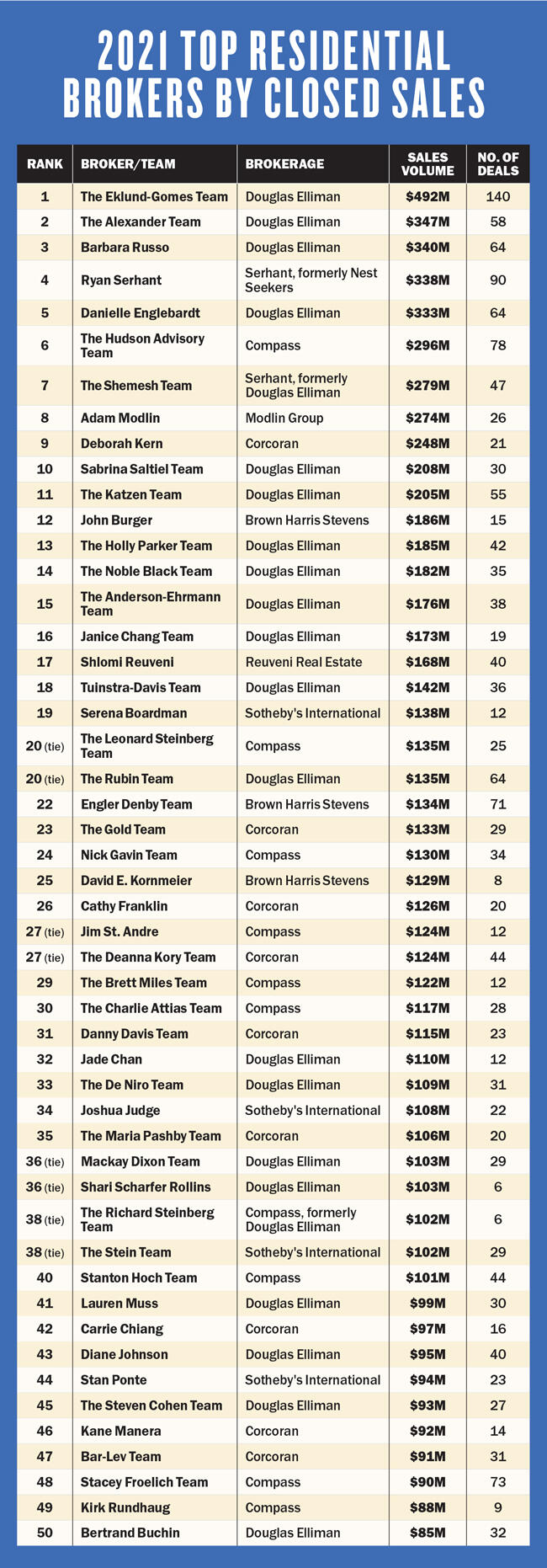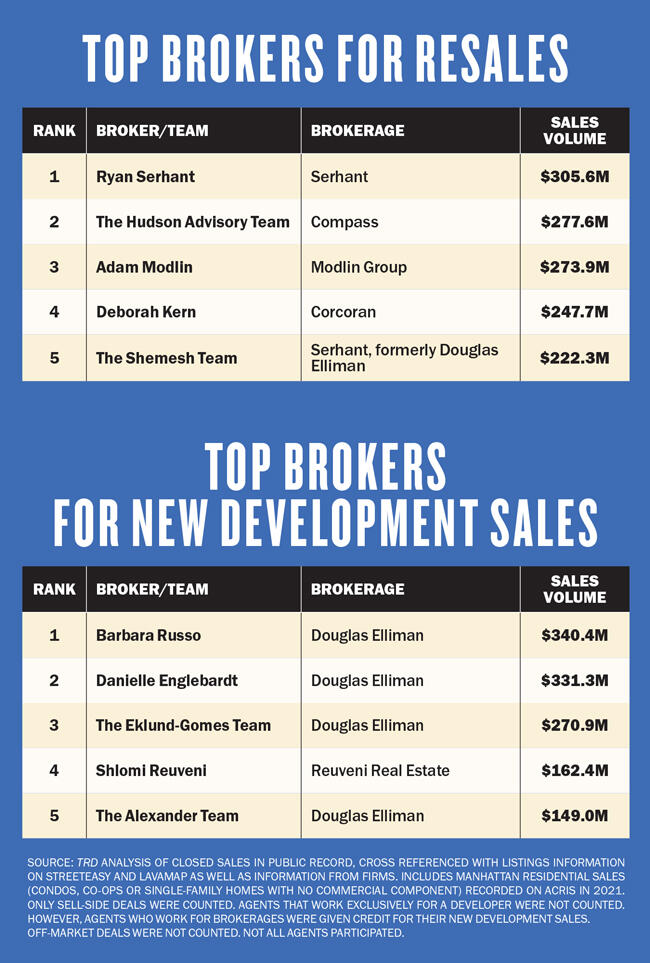Turns out pent-up demand really was a thing.
After a slow 2020, Manhattan’s residential market went into overdrive last year, pushing up home prices and wiping out inventory, particularly in the luxury segment. Despite scrambling to find listings for their eager clients, many agents enjoyed career-defining years.
The Real Deal’s annual ranking of the city’s top brokers revealed that stalwarts posted record-breaking numbers, boosted by the return of elites from pandemic retreats, while in-house veterans rode the new development wave to new heights.
To rank the borough’s top-performing broker teams of the year by sell-side transactions, TRD pulled Manhattan listings and cross-referenced them with closed deals in public records and with the brokerages. Off-market transactions and deals brokered in-house by developers’ own sales teams were excluded.
Here’s a look at who ruled the roost.
Elliman’s elites
Douglas Elliman came in second behind Corcoran Group in TRD’s annual ranking of the city’s top brokerages. But when looking at star agents, Elliman dominated — its dealmakers took the top three spots and four of the top five.
Ranking first was the Eklund-Gomes Team, which closed $492 million across 140 deals in Manhattan last year. Led by Fredrik Eklund — known for his role on Bravo’s “Million Dollar Listing” — and John Gomes, the team closed a higher volume of sell-side deals in Manhattan alone last year than it did across Brooklyn, Manhattan and Queens combined in 2020.
In a distant second came Elliman’s Alexander Team, led by brothers Tal and Oren, which closed 58 deals in the borough totaling $347 million, followed by Elliman’s Barbara Russo with $340 million across 64 deals — all of which came at Beckford House and Beckford Tower, a pair of new luxury condo buildings on the Upper East Side.
The Alexanders, mainstays among Elliman’s top-performing teams, attributed their New York success to their foothold in Miami.
“We saw what happened in the Miami market; we saw the consumer confidence that people had in trophy residential real estate,” Oren Alexander said. “We knew it was only a matter of time until we were going to get that in New York.”
 In 2020, the team saw wealthy New Yorkers fleeing south. Those New Yorkers started coming back to the city in March 2021, and inventory dried up by the end of the third quarter.
In 2020, the team saw wealthy New Yorkers fleeing south. Those New Yorkers started coming back to the city in March 2021, and inventory dried up by the end of the third quarter.
“It changed dramatically, pretty quickly,” Tal Alexander said.
A stunning comeback
Ahead of a dramatic uptick as winter turned to spring, the market got off to a relatively slow start last year. In the first quarter, 2,457 deals closed in Manhattan, up 29 percent over the lockdown-defined first quarter of 2020, but down slightly from the first-quarter average of the preceding 10 years, according to a report by appraiser Jonathan Miller.
Things picked up in the second quarter, when 3,417 deals closed, up 39 percent from the first quarter of the year and 152 percent from the same period in 2020. In the third quarter, more homes were sold in Manhattan than in any other quarter in more than three decades. The borough’s 4,523 closed sales exceeded the previous record set in the spring of 2007, when 3,939 sales were recorded.
In both strong and weak markets, the brokerage game is often reliant on relationships — including how many names agents have in their contacts lists.
The Modlin Group’s specialty of selling luxury properties means it caters to a more limited pool of buyers compared to its peers, according to Adam Modlin, who ranked eighth with $274 million in sales volume across just 26 deals.
“When you consider the profile of a buyer who’s looking to buy a $50 or $100 million townhouse in New York City, you can count the buyers on one or two hands,” Modlin said. “So it’s just a matter of connecting the dots.”
Frances Katzen said she searched her Rolodex for clients who could be persuaded to buy when the market was still relatively soft in the early part of the year. That strategy paid off, helping her team at Ellliman close $205 million in sales volume across 55 deals, good for 11th place on the list.
 With demand outweighing supply, Katzen still sees opportunity, but warned that macroeconomic factors, such as those related to the war in Ukraine, would be key.
With demand outweighing supply, Katzen still sees opportunity, but warned that macroeconomic factors, such as those related to the war in Ukraine, would be key.
“We’re an inflation hedge in a market that needs to diversify against volatile assets right now,” she said.
Even as Covid restrictions eased and in-person viewings resumed, practices perfected during the pandemic paid dividends for some brokers.
Weathering the storm
In March 2020, as prognosticators proclaimed the death of the city and investors fled for safer investments in less densely populated markets, Compass’ Hudson Advisory Team, led by Stephen Ferrara and Clayton Orrigo, was doubling down, signing a lease for office space in a townhouse in the West Village.
“There was a pause in the market where we could not practice as much physically. We weren’t running around as much in Manhattan,” Ferrara said. “Because of that, we were able to really analyze our business and pay attention to trends. We were able to get really smart about our business.”
Trends Ferrara and Orrigo are now observing include how money has flowed farther south and west in Lower Manhattan, how a lack of housing supply is causing parking garages to disappear and how retail shifts in Soho impact the residential market in the Village. The move allowed the team, which ranked sixth with $296 million in sales volume across 78 deals, to enter 2021 with “tailwinds instead of headwinds,” according to Ferrara.
“Stephen and I were on calls all day long during Covid,” said Orrigo. “We never took our foot off the gas at all, and we saw a lot of brokers, particularly brokers in the later stages of their career, throttle back. 2021 was a year where we saw the Matrix fully.”
Tamir Shemesh, a former agent at Elliman agent who jumped to Serhant at the start of this year, sold the 12th-floor unit at Extell’s 1010 Park Avenue over FaceTime to a family in Florida, who paid more than $13 million for it despite never setting foot inside.
“It sounds so strange that people will buy an apartment without actually seeing it,” said Shemesh, who came in at No. 7 with $279 million across 47 deals in his final year with Elliman. “But in the past, I sold dozens of apartments that no one [had] built. And it was based only on floor plans and renderings and visiting sales offices.”
Ryan Serhant orchestrated a flurry of deals himself, including the sale of the penthouse at 565 Broome Street, which went for just over $22 million, and the first resale at 220 Central Park South, for $33 million. His firm also took over sales at the Jolie at 77 Greenwich Street, a 90-unit project developed by Trinity Place Holdings, which is aiming for a sellout of more than $300 million.
While his firm debuted in 11th place on TRD’s annual brokerage ranking, Serhant ranked fourth among individual agents and teams, closing $338 million in sales volume across 90 transactions.
“I’m excited now to be near the bottom,” Serhant joked. “I like being number 11. I think it’s fun, because everyone else above me gets to just wait.”
